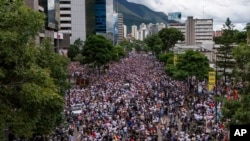Iran, like authoritarian allies China, Cuba and Russia, continue to support the government of Venezuelan President Nicolas Maduro following his disputed reelection in late July.
On September 18, Venezuelan Minister of Transportation Ramón Blázquez met with Iranian officials in Tehran to deepen bilateral cooperation and deflect credible accusations the election was rigged by promoting anti-Western conspiracy theories.
Referencing unfounded allegations that the U.S. Central Intelligence Agency conspired to assassinate Maduro, Iran’s Defense Minister Aziz Nasirzadeh said “such conspiracies will fail” if the Venezuelan government and its people remain unified and its armed forces vigilant.
Nasirzadeh further sought to legitimize the reelection of Maduro to a third six-year term in office.
“The change of governments does not alter the overall policy and approach of the Islamic Republic of Iran toward Venezuela. The Islamic Republic of Iran will certainly continue to support the legitimate and legal government of Mr. Maduro with all its strength, as it has in the past,” Nasirzadeh said.
Nasirzadeh’s claim that Maduro’s government is legal and legitimate is misleading.
Venezuela’s opposition has provided ample evidence that their candidate, Edmundo Gonzalez of the Unitary Platform, won the July 28 poll by a comfortable margin.
VOA has previously reported on how transparency safeguards at the polling stations allowed the opposition to compile verifiable evidence that Gonzalez won the election.
The opposition acquired 83.5% of the precinct-level vote tallies, showing Gonzalez received 67% of votes to Maduro’s 30%. Even if Maduro received all the remaining 16.5% of votes, he could not overcome the deficit.
Independent exit polls conducted by domestic and international election monitors had Gonzalez winning by a similar margin.
Maduro claimed the voting records, which the opposition published online, were forged.
Officials with the Maduro-aligned National Electoral Council continue to claim without evidence that pro-Gonzalez hackers tampered with the data.
However, United Nations experts who monitored the election process in Venezuela says that they have reviewed “a small sample of the documents that are currently in the public domain [including those posted online by the opposition],” and concluded that they “exhibit all the security features of the original result protocols.”
“The pre-electoral period was marked by continuous restrictions on civic and political space,” the U.N. panel reported. “The government campaign dominated state-owned media outlets, with very limited access for opposition candidates.”
Venezuela’s election authorities “fell short of the basic transparency and integrity measures that are essential to holding credible elections,” said the U.N. report.
The vote tally sheets compiled by the opposition reportedly contain readable QR codes, identifying the state and polling station where the vote was cast, along with the number of votes each party and candidate received.
Thus, the information provided by the opposition could be validated if authorities released the detailed vote counts.
The U.S., Brazil, Colombia and Mexico, along with independent election monitors, called on Venezuelan authorities to release those tabulated precinct-level official results for independent audit.
Maduro, however, has ignored calls for an independent audit and instead asked the government-aligned Supreme Tribunal of Justice to review the vote. On August 23, the court confirmed Maduro’s disputed victory.
The U.S. State Department said that “ruling lacks all credibility” in light of the “overwhelming evidence” that the opposition’s Gonzalez had “received the most votes.”
Dozens of countries refused to recognize the legitimacy of Maduro’s reelection.
On September 19, the European Parliament voted to recognize González as the legitimate and democratically elected President of Venezuela.
Maduro responded to criticism that the poll had been rigged by violently cracking down on demonstrations against his contested reelection. His security forces have arrested more than 2,000 people, and more than two dozen have been killed in the protests. The government has also begun persecuting the political opposition, forcing them into hiding or exile.
The Supreme Tribunal of Justice barred opposition figure Maria Corina Machado from running in the election. Gonzalez, who has since received asylum in Spain, only ran after Venezuelan authorities prevented another Machado stand-in, Corina Yoris, from registering her candidacy.
Gonzalez claims that Maduro allies forced him to sign a letter recognizing Maduro’s victory, while taking refuge in the Spanish embassy in Caracas.
Like other members of the opposition, the government used the criminal justice system to target Gonzalez, accusing him of conspiracy and other crimes.
On September 20, Argentina, Canada, Chile, Ecuador, Guatemala, Paraguay and Uruguay asked the United Nations Human Rights Council to investigate "grave violations" of rights in Venezuela following the election.







